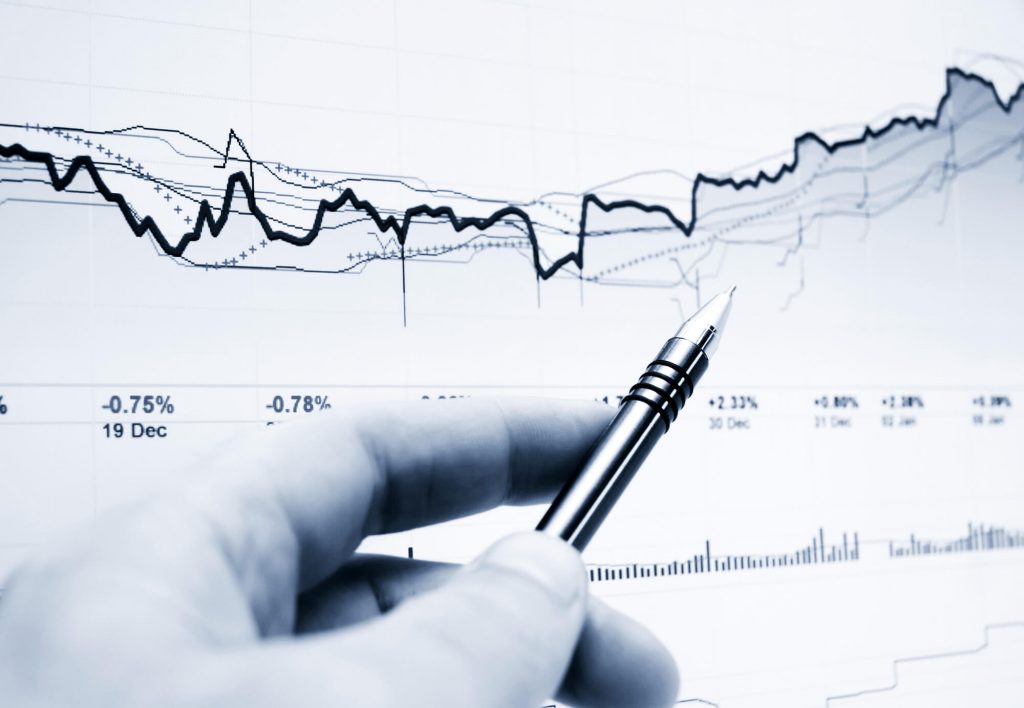
In the past year, the American economy has been severely impacted by the COVID-19 pandemic. Many Americans have suffered from losses in income due to layoffs or furloughs. The nation’s gross national product plummeted in the spring and summer of 2020. Businesses–especially small, local ones– are closing or going bankrupt in alarming numbers.
Yet through all of these conditions, the stock market appears to be thriving. After stock market indexes took a massive dive in March 2020, the securities market gradually recovered throughout the final nine months of the year. The Dow Jones Industrial Index experienced record gains, closing above 30,000 for the first time in its history.
Why is the stock market up, even as the overall economy is still largely in limbo?

Why is the Stock Market Going Up?
The “Usual” Influences
While no single theory can sufficiently explain every factor influencing the rise or fall of the stock market, there are a few common things that help to answer the question, “Why are stocks going up…or down?”
Supply and Demand
The free market system is built on the theory of supply and demand for products and commodities. The stock exchange reflects that philosophy. If stock shares in a given company are in high demand, investors pour money into that company and the price of the share increases. When demand slows down and selling activity increases, the price goes down.
Earnings
Every publicly-traded company issues quarterly financial status reports. Each report outlines how much revenue the company has made over a given period of time. Earnings are the key (but not only) indicator on these reports that investors look for. They indicate how much consumer demand exists for their product or service. Increasing earnings implies more value. But other types of financial data, like expenses and liabilities, factor into share price calculations, too.
Investor Sentiment
“Sentiment” is a tricky word to use here. It implies that stockbroking is driven by emotionality, which is true to an extent, but not always wise. True experts research, analyze data, and consider market health to predict how well a stock will perform in the future. But it would be wrong to say that emotionality –especially when it spreads from one investor to the next — doesn’t affect stock movements from time to time, for better or worse.
Events Affect Consumer Confidence
Current events often dictate stock market activity. Depending on the nature of these events, the confidence of customers and investors in overall business health and the economy rises or falls. International conflicts, government fiscal policy changes, natural disasters, inflation, and technological advances are all events that can drive shares of certain companies or business sectors to become higher or lower.
These are four of the most general elements that affect stock market fluctuations. Next, we’ll look at some of the most common causes and traits that cause an upward-trending stock market.
The Federal Reserve is Printing More Money
The Federal Reserve has what seems like a simple solution to prop up a slow economy: Putting more money into circulation. This means both printing actual paper money and electronically injecting money into commercial banks and certain government securities. All of this money has to be spent or invested somehow. When it is, the economy comes to life, investors feel enabled to increase their stock buying, and share prices increase.
In return, the federal government receives a lot of bonds, which are supported by home mortgage payments. This is done to resuscitate a stagnant economy by stimulating the issuance of bank loans, building the money supply, and generating more consumer spending. The increased cash can also be used to pay down federal debt.
Some experts and politicians warn that the money the Federal Reserve “manufactures” can have an adverse effect, like creating an artificial bubble in certain business sectors that can eventually explode. If there’s too much money in the system and not enough product to keep up, it can cause inflation, which makes consumers more likely to wait to make major purchases and slows the economy back down.
Interest Rates Are Low
The federal government is responsible for setting interest rates. Simply stated, interest charges represent the way that creditors and loan issuers earn their livings and guard against losses from missed loan repayments.
The government allows lenders to collect a certain percentage of each loan they issue as profit, on top of a loan customer’s scheduled repayments. Customers get the discretionary goods they need — homes, cars, furniture, and so forth — without having to save up for them, while creditors get something back financially for their trouble.
When interest rates are low, more borrowers have access to loans, which makes it likelier that they’ll be able to afford the big-ticket items they want to purchase. When businesses are able to make major equipment purchases, it can have a positive impact on worker activity, productivity, and output. All of these reactions to low interest rates encourage the economy to pick up.
Higher interest rates, on the other hand, result in less disposable income. Sometimes, it’s necessary to raise rates to “correct” certain market conditions, such as rising inflation. But lowering interest rates is one of the primary ways the federal government can speed up the end of a recession and encourage consumers to get the economy moving again.
Market Sentiment, Expectations, and Expert Advice
Investment markets are often swayed by crowd psychology. If multiple investors feel optimistic about the stock market, you’ll usually see an overall increase in activity and share values across multiple sectors. We call this a bull market. Conversely, if pessimism or caution rules the collective investor mindset, the stock market slows down and decreases in value, which we call a bear market.
The problem with market sentiment is that, while its effect on stock activity can’t be denied, it’s not always based on a rational scrutiny of facts and data. The market sentiment is especially susceptible to sudden, unforeseeable events that don’t necessarily speak to a commodity’s long-term value. While it’s foolish to completely ignore the effects of market sentiment, it must be perceived as a market force that’s not always backed up by reality, history, or fundamental analysis.
When reviewing market sentiment, it’s vital to understand what the prevailing opinion about certain sectors currently is, subject to as much reasonable interpretation as you can. Sometimes an expert may reflect a market sentiment that’s completely off-target or not grounded in reality. Other times, they may nail it. The important thing is to treat every opinion with initial skepticism and subject it to more research. No market sentiment should always be taken at face value.
Buying the Dips
“Buy low, sell high” is the most common cliché you hear when people dispense with stock-buying advice — but it’s usually true. When investors see a blue-chip stock take a dip in value, they’re more inclined to buy into it if they believe the downturn is only temporary and the business stands to regain its temporary losses.
Since the 2008-09 recession, “buying the dip” on certain stocks and holding on to them as their prices go back up has been a solid strategy. After suffering through that last, massive correction, the stock market has experienced uniform growth with only a few, brief periods of downturn. Companies that survived the recession found multiple investors ready to buy when their share prices were low — which led to more stock purchases, more business activity, and stock value increases.
Some active investors go all-in on stocks that are being offered at low prices. Again, sometimes, this activity is affected by irrational, wide-scale market sentiment; but sometimes it’s based on reasonable, calculated research. As with any stock purchase, making a careful examination of current market forces and a review of realistic projections can guide your decision.
Stock Market Health Isn’t the Same as Overall Economic Health
When one asks, “Why are stocks going up?”, they’re asking about a very specific aspect of the economy.
The stock market is just one indicator of a nation’s overall economic health. It’s not the sole determinant. The stock market only represents the economic interests of those who actually invest in it.
The National Bureau of Economic Research says that 84% of the total value of the securities market — stocks, bonds, mutual funds, and so forth — is controlled by the wealthiest 10% of U.S. households. In June 2020, Gallup determined that only 55% of all Americans owned any stock at all. That leaves 45% of the population whose economic prosperity is tied to their own employment (or lack of it), their own savings, property holdings, debt profiles, assets, and liabilities.
So while a regional or local economy may be suffering through high unemployment, low gross product, or tepid consumer activity, the stock market may be thriving because enough investors believe the overall future looks bright.

Why is the Stock Market Up Right Now?
Given all of these traditional forces that typically influence the securities market to go up, what factors are in play right now that affect the securities market, even as the overall economy is taking longer to revive? Why is the stock market up? There are a few possible reasons:
There is More Investment in Companies That Support Everyday Pandemic Life
After the stock market tanked in March 2020 due to concerns about the pandemic, investors started taking a longer view about what securities would thrive both during and after the COVID crisis. Some sectors experienced immediate benefits. For example, Zoom, Netflix, and Amazon all made gains, as did other products and services that adapted. Continued investments in those properties increased market activity.
More Money is Being Printed
The Federal Reserve is printing money in near-record proportions to stave off another recession for as long as they can, which drives economic activity among investors. Furthermore, the promise of stimulus deals to revive the economy is fueling optimism and stock market health.
There Are Low-Interest Rates, Now and in the Immediate Future
The Federal Reserve has also promised to keep interest rates close to zero through the end of 2023, which encourages continued consumer spending.
There Are More Investors Performing More Activity
The year 2020 saw a big leap in the number of investors who were completely new to the stock market. That activity helped to raise share values across the board.
People Have A Hopeful Outlook for the Future
The stock market is all about future projections and expectations. Right now, investors are optimistic that many businesses have a promising future, especially now that a vaccine for COVID-19 is headed toward the mainstream, lockdowns are easing, and the public is getting back into the regular flow of economic activity. Conversely, a long delay in the vaccine can temper optimism quickly. But for now, realistic hope is encouraging stock activity.

Why Are Stocks Going Up? Gorilla Trades Helps You Take Advantage of Market Trends
At Gorilla Trades, clients are finding success on the stock market, thanks to our realistic approach to stock picking and our guidance for aggressive investors at every step of their journey. Sign up for a free trial to find out how it works.
